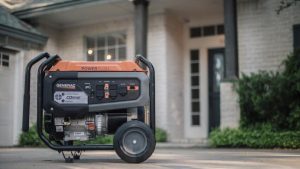As South Africans, we’ve had the fairly unique, humbling experience of realising what it means to appreciate having electricity provided to us in a way most other countries don’t. Nothing fills South Africans with more dread than hearing or reading the phrase ‘load-shedding expected’. But, as with any problem, it offers an opportunity for enterprising folks to provide a solution.
In the case of coping with load-shedding the most common ways to address it (outside of old school reading by candlelight) is to invest in either a power inverter or a generator. Although they both make coping with load-shedding easier they’re fundamentally quite different, and we’re going to unpack the major differences to be aware of before selecting to buy one.

Before we do that, though, let’s break down a few of the basics of how inverters and generators function. A generator is effectively like a compact engine that runs on fuels like diesel in order to generate electricity, and for the most part, it’s almost exactly like the electricity you receive from Eskom. An inverter, on the other hand, provides power from stored up electricity and operates a lot like a massive smartphone battery.
What do you want to run on it?
This is probably the most important consideration when it comes to choosing between an inverter, or a generator. An inverter is ideal for electronics and will deal with charging your laptops and smartphones and running your TV, router, and some lights quite easily. It won’t cope very well with appliances like fridges or heaters, though — anything that needs to heat or cool is going to be quite taxing for an inverter to manage and is best left to a traditional generator. If you can make a plan with your heating and cooling needs for a few hours an inverter is fine, but for something like a restaurant or a shop that has a cold-chain to preserve a generator might be necessary.
Noise
Whether it’s for your own sake or for everyone else’s, the noise level of your selection could play a role in what you get. Generators are combustion engines, so imagine your car idling a short distance from your living room and you’ll have a decent idea of what having a generator will be like. Inverters, luckily, don’t generate much noise if any at all, so they won’t inconvenience you or the neighbours. If you’re in a small apartment or you’re very close to your neighbours an inverter will be appreciated by all parties and will help avoid any neighbourhood feuds.
Location of Device
Where you’ll be keeping the device you choose is also going to play a role in what’s feasible to get. The first issue to consider is space; generators and inverters are somewhat large but generators are a tad more cumbersome and inconvenient, so moving it around often or keeping it in a cramped space simply isn’t going to be particularly easy. The other issue to keep in mind is that generators will emit fumes, so optimally you’ll want to keep it somewhere outside so that the fumes don’t enter the house, but it will need to be protected from the elements at the same time.
If an indoor spot is your only option you’ll be somewhat restricted to only choosing an inverter, but if you’ve got space in a well-ventilated garage or under a lapa a generator is also feasible.
Even though it’s a pain in the neck to have to make plans for additional power supplies there are fortunately more and more inverter and generator options hitting the market here. If you’re interested in scoping out the options of inverters or generators then check out PriceCheck and find one that suits what you need!



